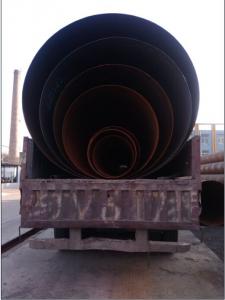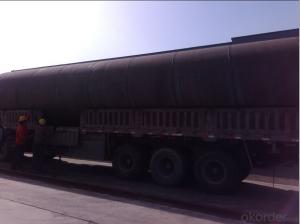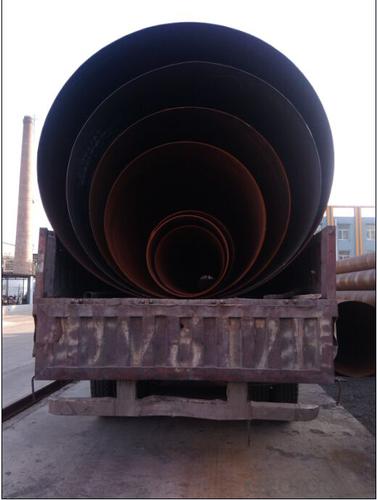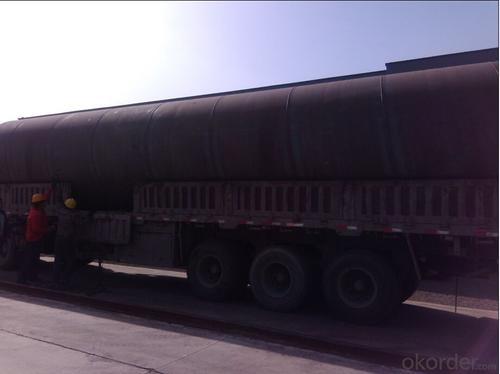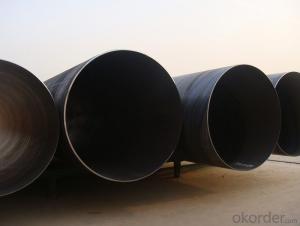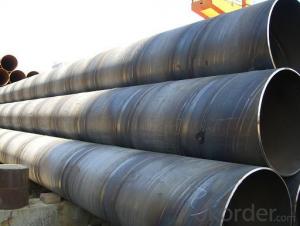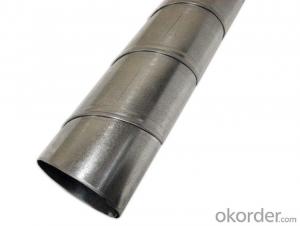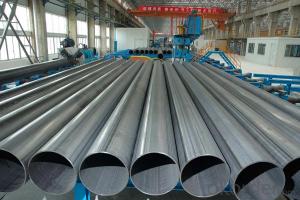SPIRAL STEEL PIPE CARBON ASTM/ API/JIS/ DIN
- Loading Port:
- China Main Port
- Payment Terms:
- TT OR LC
- Min Order Qty:
- -
- Supply Capability:
- -
OKorder Service Pledge
OKorder Financial Service
You Might Also Like
Packaging & Delivery
Packaging Detail: | standard export packing or as customer's requirement |
Delivery Detail: | within 10 - 30 days |
Specifications
Spiral Welded Steel Pipes and Tubes
1.Material:Q195-Q235
2.Length:1-12m
3.WT:1.0-14mm
4.O.D.:20-273mm
Spiral Welded Steel Pipes and Tubes
Product Description:
1.Material : Q235,Q345,L245,L290,L360,L415,L450,L485,GrB,X42,46,X52,X56,X60,X65,X70,X80,X100
2,Standard: SY/T5037-2000,GB/T9711-2011,API Spec 5L PSL1/PSL2,ASTM A252\A53,ISO3183,DIN17172,EN10217,JIS G3457,AWWA C200,ASTM A139,ASTM A671,ASTM A672
3.Wall thickness: 3.0mm-30mm
4.Outer diameter: φ168mm-3020mm
5,Length: 5m-12m or as your requirement
6,Corrosion protection standard: DIN30670,DIN30671, AWWAC210, AWWA C203, SY/T0413-2002,SY/T0414-2002
7,Application: Oil, gas, natural gas, water pipe, thermal electricity pipe, steel structure engineering, etc
Q195-q345 Material Steel Pipe's Materials
Elements | Chemical Compsition% | Mechanical Property | ||||||
| C% | Mn% | S% | P% | Si% | Yield Point (Mpa) | Tensile Strength(Mpa) | Elongation |
Q195 | 0.06-0.12 | 0.25-0.50 | <0.050 | <0.045 | <0.030 | >195 | 315-430 | 32-33 |
Q215 | 0.09-0.15 | 0.25-0.55 | <0.05 | <0.045 | <0.030 | >215 | 335-450 | 26-31 |
Q235 | 0.12-0.20 | 0.30-0.70 | <0.045 | <0.045 | <0.030 | >235 | 375-500 | 24-26 |
Q345 | <0.20 | 1.0-1.6 | <0.040 | <0.040 | <0.55 | >345 | 470-630 | 21-22 |
- Q: How do you determine the required wall thickness for steel pipes?
- The required wall thickness for steel pipes is determined by considering various factors such as the internal pressure, external loads, pipe material, and the desired safety factor. This is typically calculated using engineering principles, industry standards, and specific pipe design codes to ensure the pipe can withstand the anticipated conditions without failure or deformations.
- Q: Can steel pipes be used for underground applications?
- Yes, steel pipes can be used for underground applications. They are commonly used for underground piping systems in various industries such as water, oil, and gas. The durability and strength of steel make it suitable for withstanding underground conditions, providing reliable and long-lasting performance.
- Q: What is the difference between black and galvanized steel pipes?
- The main difference between black and galvanized steel pipes lies in their coating. Black steel pipes are untreated and have a dark, uncoated appearance, while galvanized steel pipes are coated with a layer of zinc to prevent corrosion. This zinc coating on galvanized pipes helps protect against rust and extends their lifespan, making them suitable for outdoor and exposed applications. Black steel pipes, on the other hand, are typically used for indoor applications and are often painted or coated after installation to prevent rusting.
- Q: Are steel pipes suitable for use in automotive industries?
- Yes, steel pipes are suitable for use in automotive industries. They are known for their strength, durability, and resistance to high temperatures and pressure, making them an ideal material for various applications such as exhaust systems, fuel lines, and structural components in automobiles. Steel pipes also offer excellent corrosion resistance, ensuring long-lasting performance in harsh environments.
- Q: How are steel pipes used in the telecommunications sector?
- Steel pipes are commonly used in the telecommunications sector for underground cable management and protection. These pipes provide a durable and secure conduit for telecommunication cables, ensuring their safety from external factors such as weather, vandalism, and accidental damage. Steel pipes also offer excellent strength and resistance to corrosion, making them ideal for long-term use in telecommunications infrastructure.
- Q: How are steel pipes used in the wastewater treatment industry?
- Steel pipes are commonly used in the wastewater treatment industry for various applications such as transporting wastewater, distributing chemicals, and constructing infrastructure such as treatment plants and pumping stations. The durability, strength, and corrosion resistance of steel pipes make them ideal for handling the harsh and corrosive nature of wastewater, ensuring efficient and reliable operations in the industry.
- Q: What is the purpose of galvanizing steel pipes?
- The purpose of galvanizing steel pipes is to provide them with a protective coating that helps prevent corrosion and extends their lifespan.
- Q: Can steel pipes be used for hydroelectric power plants?
- Yes, steel pipes can be used for hydroelectric power plants. Steel pipes are commonly used to transport water in hydroelectric power plants for various purposes such as intake systems, penstocks, and discharge systems. They offer durability, strength, and resistance to corrosion, making them suitable for the challenging environments found in hydroelectric power generation.
- Q: How are steel pipes used in the manufacturing of solar power systems?
- Steel pipes are commonly used in the manufacturing of solar power systems for various purposes. They are used as structural supports for solar panels, providing stability and durability. Additionally, steel pipes are often utilized for the transportation of fluids such as water or heat transfer fluids, enabling the efficient circulation of these substances within the solar power system.
- Q: What are the safety precautions when working with steel pipes?
- When working with steel pipes, some important safety precautions to follow include wearing appropriate personal protective equipment (PPE) such as gloves, safety glasses, and steel-toed boots to protect against potential injuries. Additionally, it is essential to ensure proper ventilation in the work area to prevent the accumulation of hazardous fumes or gases. Using the correct tools and equipment, such as pipe wrenches and clamps, and following proper lifting techniques are crucial to avoid strains or back injuries. Regular inspection and maintenance of the pipes and equipment are also necessary to prevent any potential accidents. Lastly, it is important to receive proper training and follow established safety procedures to minimize risks and promote a safe working environment.
Send your message to us
SPIRAL STEEL PIPE CARBON ASTM/ API/JIS/ DIN
- Loading Port:
- China Main Port
- Payment Terms:
- TT OR LC
- Min Order Qty:
- -
- Supply Capability:
- -
OKorder Service Pledge
OKorder Financial Service
Similar products
Hot products
Hot Searches
Related keywords
